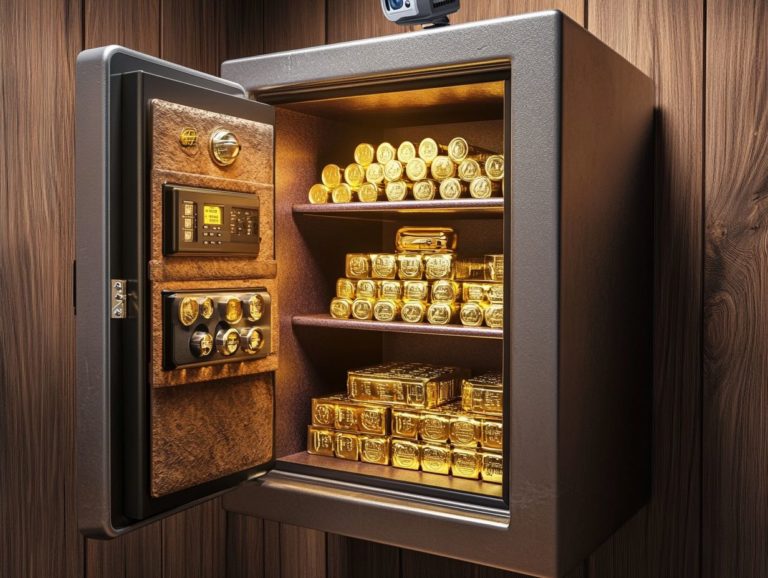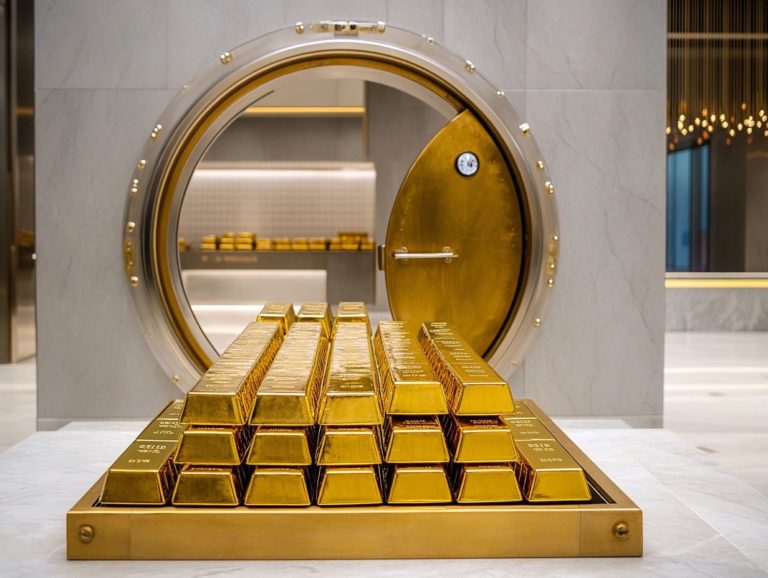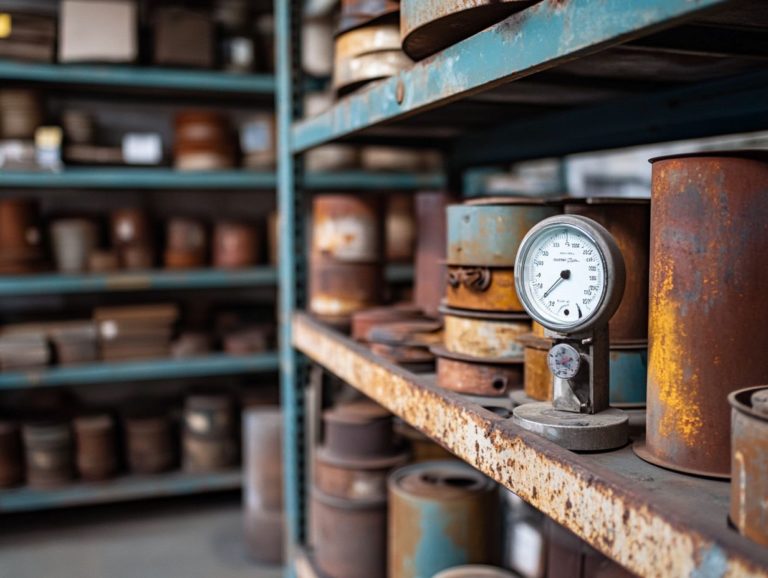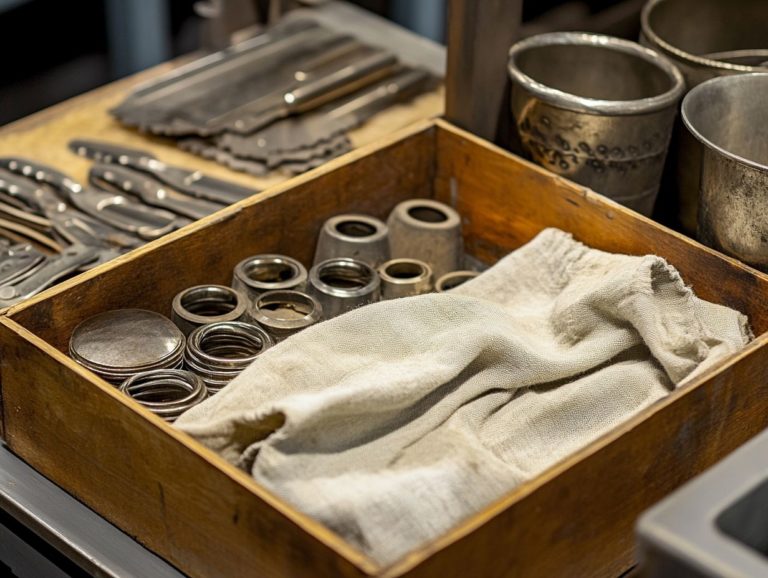Top 5 Storage Solutions for Precious Metals
When it comes to keeping your precious metals safe, choosing the right storage solution is essential. With a range of options available from home safes to bank vaults understanding the advantages and disadvantages of each will empower you to make an informed decision.
This article delves into the top five storage solutions for precious metals, highlighting key factors to consider, associated costs, and common pitfalls to avoid.
Whether you re a seasoned investor or just beginning your journey, get ready to uncover essential tips that will keep your assets safe and sound! Are you ready to find the safest way to store your precious metals?
Let s explore the possibilities.
Contents
- Key Takeaways:
- 1. Home Safes
- 2. Safety Deposit Boxes
- 3. Precious Metal Depositories
- 4. Bank Vaults
- 5. Hidden Storage Solutions
- What Are the Most Important Factors to Consider When Choosing a Storage Solution for Precious Metals?
- What Are the Pros and Cons of Each Storage Solution?
- How Can One Ensure the Security of Their Precious Metals in Storage?
- What Are the Costs Associated with Each Storage Solution?
- What Are Some Common Mistakes to Avoid When Storing Precious Metals?
- What Are Some Additional Tips for Safely Storing Precious Metals?
- Frequently Asked Questions
- What are the top 5 storage solutions for precious metals?
- How do home safes compare to other storage options for precious metals?
- Are bank safe deposit boxes a secure option for storing precious metals?
- What are private vaults and how do they differ from other storage options?
- Can I use a precious metal storage company for storing my investments?
- What are the advantages of using a private storage facility for storing precious metals?
- Which storage solution will you choose to protect your wealth?
Key Takeaways:
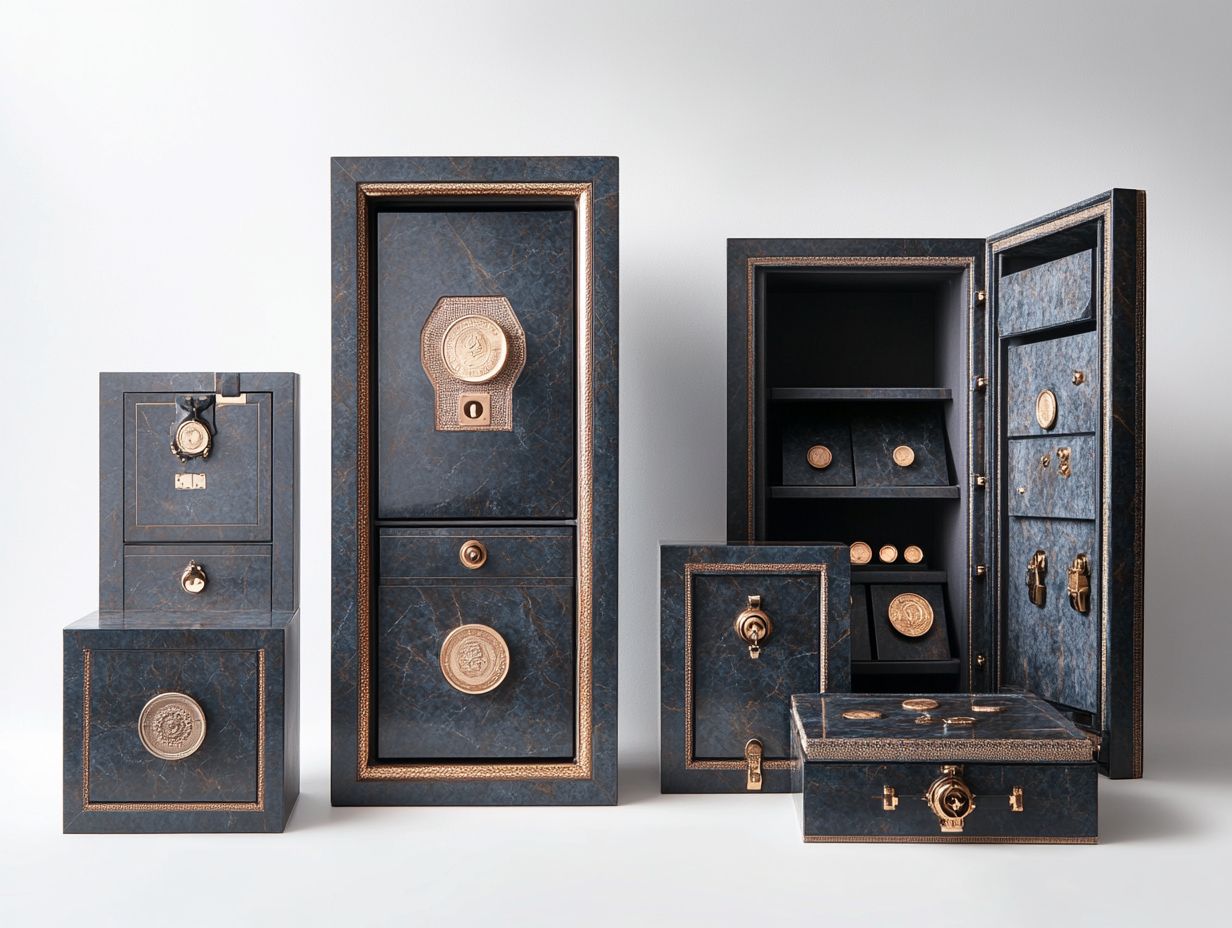
- Home safes provide convenience and accessibility for storing precious metals but may lack sufficient protection against theft or natural disasters.
- Safety deposit boxes offer a secure and regulated storage option but may have limited access and potential government seizure risks.
- Precious metal depositories provide high security and insurance coverage but may involve additional fees and limited control over the metals.
1. Home Safes
Home safes have become a favored choice for storing precious metals like gold and silver. They offer a convenient and secure solution for safeguarding your valuable collection. These safes protect against theft, fire, and other risks while ensuring fast accessibility and providing peace of mind through insurance coverage.
These safes come in various types, including fireproof models, water-resistant options, and biometric safes that utilize fingerprints for access. Each type boasts unique security features, such as solid steel construction and advanced locking mechanisms, guaranteeing that your valuables remain well-guarded.
Most homeowners can easily insure a home safe and its contents, adding an extra layer of protection against unforeseen events. The advantages of opting for a home safe over alternatives like banks or safety deposit boxes include enhanced accessibility and tailored security to suit your needs.
When selecting a safe, consider factors such as size, weight, and cost. These will influence where it can be positioned and how much you should invest in this essential protection.
2. Safety Deposit Boxes
Safety deposit boxes offer a secure method to store your precious metals at banks. They provide enhanced protection against theft and natural disasters while ensuring that your investment remains liquid and accessible.
Typically situated within a bank’s vault, these boxes guarantee a high level of security, featuring monitored access and state-of-the-art locking mechanisms. You can rent one for an annual fee, which varies based on the size of the box and the bank’s location. While they bring peace of mind, accessing your safety deposit box may require a trip to the bank during its operating hours and is subject to specific regulations.
Home safes offer 24/7 access but may be more susceptible to break-ins or fire. The choice between a safety deposit box and a home safe depends on your individual needs for security, convenience, and peace of mind, all while considering the associated costs.
3. Precious Metal Depositories
Use precious metal depositories for secure storage of gold, silver, and other precious metals. They provide options like allocated (specific items assigned to you) and segregated vault storage, tailored to meet your diverse investment needs while offering peace of mind through strong security systems and comprehensive insurance policies.
Allocated storage links specific bars or coins directly to you, ensuring that your assets are uniquely identifiable and reserved just for you. This option may come with a premium but provides the comfort of knowing exactly what you own. Segregated storage allows your assets to share space within the vault while still maintaining a distinct section for your ownership.
Both methods are fortified with stringent security measures, including advanced surveillance systems and armed personnel designed to deter theft.
Reputable facilities often provide insurance coverage to safeguard your investments against unforeseen events. While these services come with their own costs, many find the benefits invaluable when it comes to securing their financial future.
4. Bank Vaults
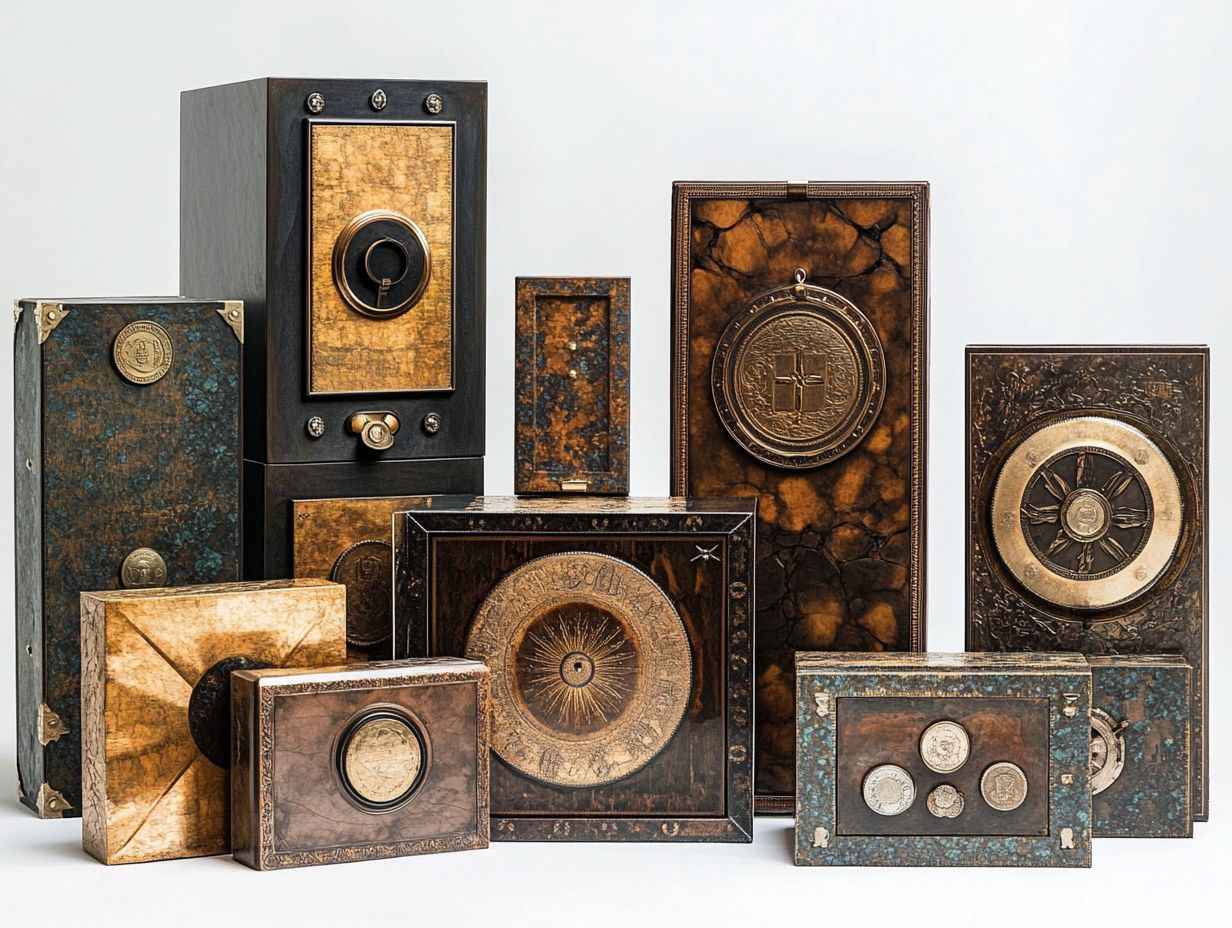
Bank vaults offer a highly secure environment for storing precious metals, effectively combining advanced security measures with the trust and reputation of established financial institutions. However, don’t forget about recurring fees and accessibility concerns.
The multiple layers of protection that bank vaults provide typically include robust physical barriers, cutting-edge surveillance systems, and stringent access controls. These measures ensure that your valuables are shielded from theft, loss, and natural disasters. While relying on such facilities can ease your worries, it’s essential to consider the recurring fees that may apply. These costs can accumulate over time, potentially diminishing some of the benefits you initially perceived.
Home safes may also be a more accessible option, granting you immediate access to your possessions. Yet, these alternatives carry their own set of risks, including vulnerability to theft or inadequate climate control.
5. Hidden Storage Solutions
Hidden storage solutions are a smart way for precious metal investors to protect their assets from theft and loss. By choosing discreet locations and innovative concealment strategies, you can enhance the safety of your valuables.
Utilizing unconventional storage spots such as false walls, secret compartments within furniture, or cleverly disguised garden fixtures can significantly strengthen the security of your holdings. Consider incorporating family heirlooms or common household items as effective decoys, making it harder for potential intruders to locate valuable assets.
While these hidden strategies can significantly boost your security, they may also introduce accessibility challenges. You need to remember specific locations, which can be tricky. In contrast, traditional storage options like safe deposit boxes offer quick access but lack the same level of discretion, making them easier targets for thieves.
Weighing these factors is essential for anyone considering the best ways to safeguard investments.
What Are the Most Important Factors to Consider When Choosing a Storage Solution for Precious Metals?
When choosing a storage solution for your precious metals, it’s crucial to weigh key factors like security, cost, accessibility, and the availability of insurance. This careful consideration is vital to ensure your assets are well-protected against market volatility and risks such as theft and natural disasters.
Understanding the nuances of security infrastructure is paramount. Factors like rigorous surveillance, access control, and fireproof environments can significantly influence the safety of your collection. You ll want insurance coverage that aligns with the value of your assets; understanding your policy helps you mitigate potential losses.
Cost comparisons among different storage facilities will reveal that not all options offer equal value for money. Assess your unique needs, whether you re an individual collector or a corporation managing extensive holdings. Each investor will find that these considerations directly impact their choice of storage, striking a balance between securing valuable assets and managing associated costs.
What Are the Pros and Cons of Each Storage Solution?
Every storage solution for precious metals has its own set of pros and cons, which can significantly influence your decisions based on your specific needs for security, accessibility, and costs.
For example, home safes provide immediate access to your assets, but they might not offer the strongest protection against theft or fire. In contrast, safe deposit boxes in banks deliver heightened security, yet may be less accessible, especially during traditional banking hours.
Precious metal depositories often boast advanced security systems, making them a strong choice for serious investors, though they usually come with annual fees. For a deeper look into these expenses, consider understanding the costs of physical asset storage. Bank vaults can also provide exceptional security, but they involve costs and may limit your accessibility.
Each option caters to different types of investors, ranging from casual collectors to dedicated wealth preservationists. It’s crucial to evaluate your personal priorities when selecting a storage solution.
How Can One Ensure the Security of Their Precious Metals in Storage?
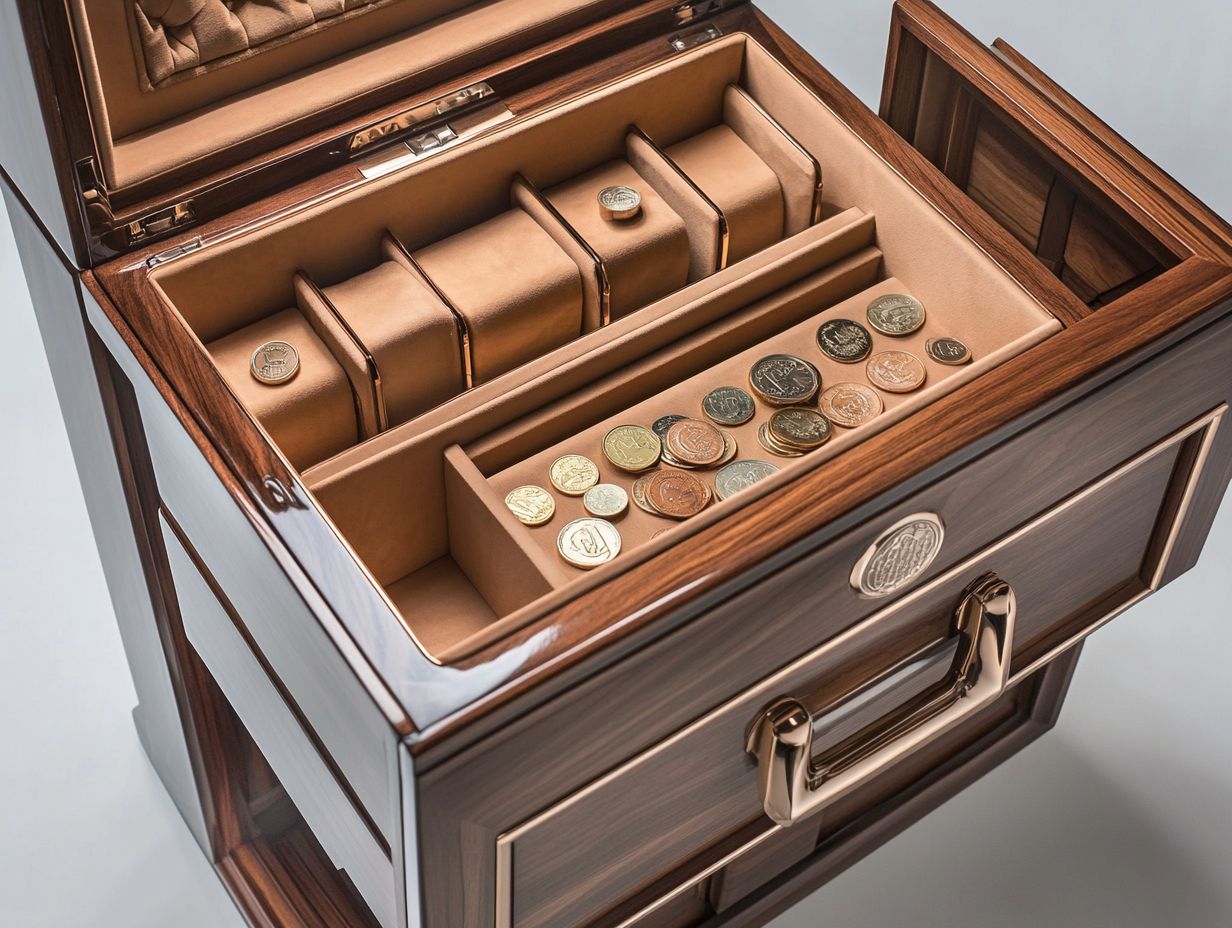
Ensuring the security of your precious metals in storage requires a well-rounded approach. You must carefully choose the right storage solution, implement advanced security measures, and secure adequate insurance coverage to protect against potential risks.
Establishing a robust security framework is essential. Conduct regular audits of your inventory to monitor and identify any discrepancies. Investing in comprehensive insurance policies is also crucial; these should cover theft and damages from unforeseen events like natural disasters.
When selecting storage providers, choose those with a solid reputation for reliability and stringent security protocols. Look for options that employ state-of-the-art surveillance systems, secure access controls, and climate monitoring. To make informed decisions, consider exploring the top resources for precious metals research. These features can significantly enhance the protection of your stored precious metals, ensuring both physical security and suitable environmental conditions.
What Are the Costs Associated with Each Storage Solution?
The costs of storing precious metals can vary significantly depending on your chosen solution. Safety deposit boxes, depositories, and bank vaults each come with different financial implications for you as an investor.
For example, safety deposit boxes are typically offered by banks with an annual rental fee that may initially seem budget-friendly. However, they often lack comprehensive insurance options. In contrast, private depositories may have initial setup fees, along with ongoing monthly or annual storage charges. They usually offer enhanced security measures, providing greater peace of mind.
It’s also vital to consider the insurance premiums associated with each storage method. Some facilities include coverage in their fees, while others may require you to obtain separate policies. Ultimately, your decision should balance cost, security, and accessibility to ensure you select an option that offers peace of mind without breaking the bank.
What Are Some Common Mistakes to Avoid When Storing Precious Metals?
Investors often stumble into common pitfalls when it comes to storing precious metals. Neglecting to secure adequate insurance, failing to conduct regular inventory audits, and overlooking the importance of selecting a trustworthy storage provider can all lead to serious consequences.
Such oversights can result in significant financial loss and unnecessary stress. It s crucial for you, as a precious metals investor, to thoroughly research and choose a reputable storage facility with robust security measures, including high-quality surveillance and climate control.
Maintain a detailed inventory log and conduct regular audits to effectively track the status of your holdings. By proactively addressing these pitfalls, you can protect your assets, minimize risks, and enjoy the peace of mind that comes with knowing your investments are secure.
What Are Some Additional Tips for Safely Storing Precious Metals?
As an investor keen on safeguarding precious metals, implementing additional security measures, keeping an updated inventory, and regularly reviewing insurance policies can significantly enhance the protection of your investments.
Beyond these fundamental strategies, consider utilizing a safe deposit box at a reputable financial institution for added peace of mind. Choose a location that boasts advanced security features, such as surveillance cameras and climate control, to ensure the integrity of your metals over time. Additionally, be aware of the storage costs for precious metals that may apply.
Employing a detailed inventory system whether digital or physical will help you track every piece effectively. Additionally, review your insurance policies at least once a year to address potential gaps in coverage, ensuring that your investments are well-protected against unexpected events.
Frequently Asked Questions
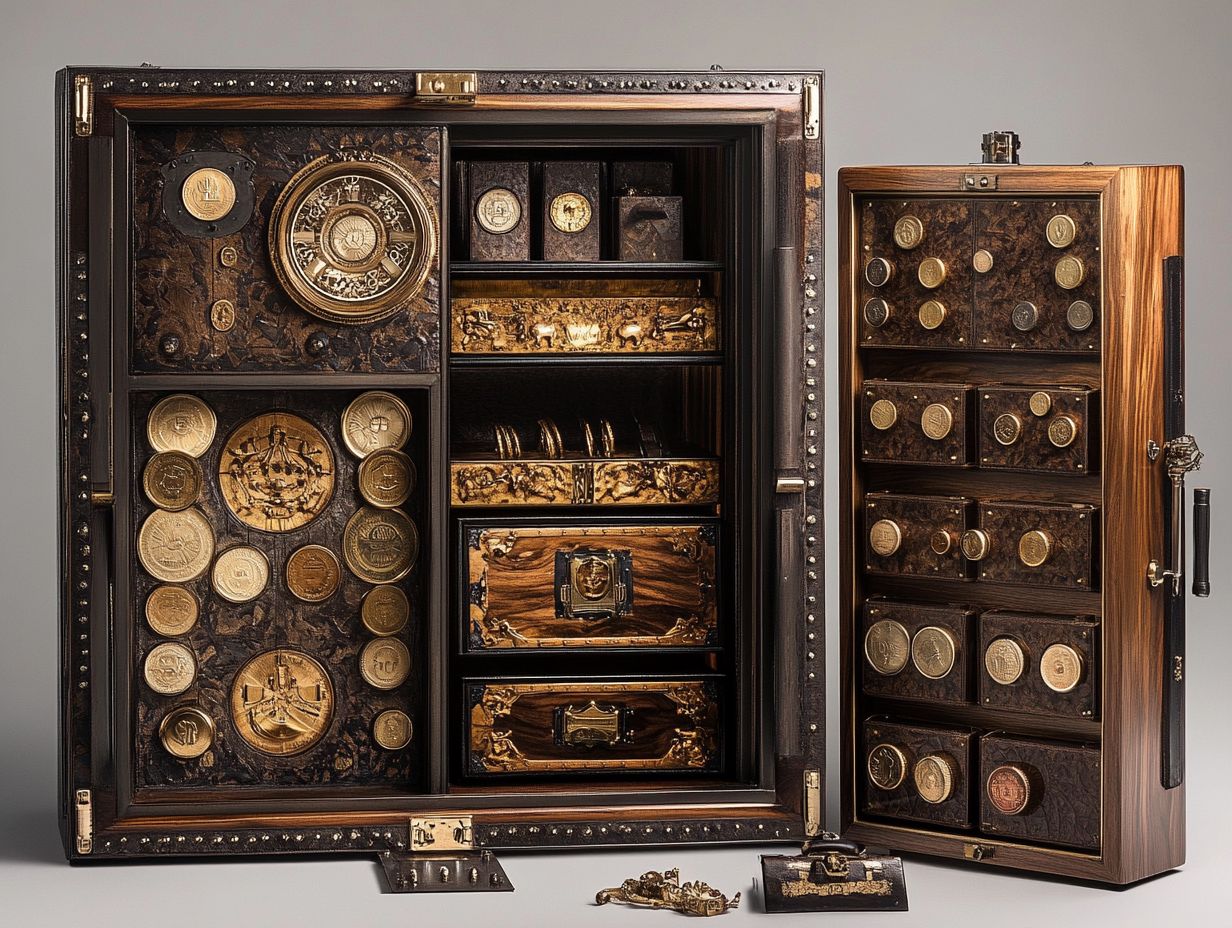
What are the top 5 storage solutions for precious metals?
- Home safes
- Bank safe deposit boxes
- Private vaults
- Precious metal storage companies
- Private storage facilities
Explore these secure options today to protect your investments!
How do home safes compare to other storage options for precious metals?
Home safes provide a convenient and cost-effective way to store precious metals. However, they might not offer the same level of security as bank safe deposit boxes or private storage facilities.
Are bank safe deposit boxes a secure option for storing precious metals?
Bank safe deposit boxes are a trusted choice for safeguarding your valuables! They offer a high level of security since they are located in a bank vault and can only be accessed by the owner or authorized individuals.
What are private vaults and how do they differ from other storage options?
Private vaults are secure storage facilities specifically designed for valuable items, including precious metals. They provide enhanced security and privacy, often catering to high net worth individuals and businesses.
Can I use a precious metal storage company for storing my investments?
Yes, precious metal storage companies specialize in securely storing precious metals for investors. They offer various storage options, including allocated (which means you own specific bars or coins) and unallocated (where your investment is part of a pool) storage, and they have insurance policies in place to protect your investment.
What are the advantages of using a private storage facility for storing precious metals?
Private storage facilities offer a high level of security and privacy. They also provide customization options and may offer additional services such as auditing, insurance, and delivery services for your precious metals.












